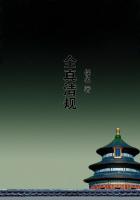Now, mark how the wickedness of the king turned the confidence of the sire to the peril of the son, by commanding that this dearest pledge of his life should be placed instead of the wand, with a threat that, unless the author of this promise could strike off the apple at the first flight of the arrow, he should pay the penalty of his empty boasting by the loss of his head. The king's command forced the soldier to perform more than he had promised, and what he had said, reported, by the tongues of slanderers, bound him to accomplish what he had NOT said. Yet did not his sterling courage, though caught in the snare of slander, suffer him to lay aside his firmness of heart; nay, he accepted the trial the more readily because it was hard. So Palnatoki warned the boy urgently when he took his stand to await the coming of the hurtling arrow with calm ears and unbent head, lest, by a slight turn of his body, he should defeat the practised skill of the bowman; and, taking further counsel to prevent his fear, he turned away his face, lest he should be scared at the sight of the weapon. Then, taking three arrows from the quiver, he struck the mark given him with the first he fitted to the string. . . . . But Palnatoki, when asked by the king why he had taken more arrows from the quiver, when it had been settled that he should only try the fortune of the bow ONCE, made answer, 'That I might avenge on thee the swerving of the first by the points of the rest, lest perchance my innocence might have been punished, while your violence escaped scot-free.' "[2]
[2] Saxo Grammaticus, Bk. X. p. 166, ed. Frankf. 1576.
This ruthless king is none other than the famous Harold Blue-tooth, and the occurrence is placed by Saxo in the year 950. But the story appears not only in Denmark, but in Fingland, in Norway, in Finland and Russia, and in Persia, and there is some reason for supposing that it was known in India.
In Norway we have the adventures of Pansa the Splay-footed, and of Hemingr, a vassal of Harold Hardrada, who invaded England in 1066. In Iceland there is the kindred legend of Egil brother of Wayland Smith, the Norse Vulcan. In England there is the ballad of William of Cloudeslee, which supplied Scott with many details of the archery scene in "Ivanhoe."Here, says the dauntless bowman,"I have a sonne seven years old;Hee is to me full deere;
I will tye him to a stake--
All shall see him that bee here--
And lay an apple upon his head, And goe six paces him froe, And I myself with a broad arrowe Shall cleave the apple in towe."In the Malleus Maleficarum a similar story is told Puncher, a famous magician on the Upper Rhine. The great ethnologist Castren dug up the same legend in Finland. It is common, as Dr. Dasent observes, to the Turks and Mongolians; "and a legend of the wild Samoyeds, who never heard of Tell or saw a book in their lives relates it, chapter and verse, of one of their marksmen." Finally, in the Persian poem of Farid-Uddin Attar, born in 1119, we read a story of a prince who shoots an apple from the head of a beloved page. In all these stories, names and motives of course differ; but all contain the same essential incidents. It is always an unerring archer who, at the capricious command of a tyrant, shoots from the head of some one dear to him a small object, be it an apple, a nut, or a piece of coin. The archer always provides himself with a second arrow, and, when questioned as to the use he intended to make of his extra weapon, the invariable reply is, "To kill thee, tyrant, had I slain my son." Now, when a marvellous occurrence is said to have happened everywhere, we may feel sure that it never happened anywhere. Popular fancies propagate themselves indefinitely, but historical events, especially the striking and dramatic ones, are rarely repeated. The facts here collected lead inevitably to the conclusion that the Tell myth was known, in its general features, to our Aryan ancestors, before ever they left their primitive dwelling-place in Central Asia.
It may, indeed, be urged that some one of these wonderful marksmen may really have existed and have performed the feat recorded in the legend; and that his true story, carried about by hearsay tradition from one country to another and from age to age, may have formed the theme for all the variations above mentioned, just as the fables of La Fontaine were patterned after those of AEsop and Phaedrus, and just as many of Chaucer's tales were consciously adopted from Boccaccio. No doubt there has been a good deal of borrowing and lending among the legends of different peoples, as well as among the words of different languages; and possibly even some picturesque fragment of early history may have now and then been carried about the world in this manner. But as the philologist can with almost unerring certainty distinguish between the native and the imported words in any Aryan language, by examining their phonetic peculiarities, so the student of popular traditions, though working with far less perfect instruments, can safely assert, with reference to a vast number of legends, that they cannot have been obtained by any process of conscious borrowing. The difficulties inseparable from any such hypothesis will become more and more apparent as we proceed to examine a few other stories current in different portions of the Aryan domain.
As the Swiss must give up his Tell, so must the Welshman be deprived of his brave dog Gellert, over whose cruel fate Iconfess to having shed more tears than I should regard as well bestowed upon the misfortunes of many a human hero of romance.















